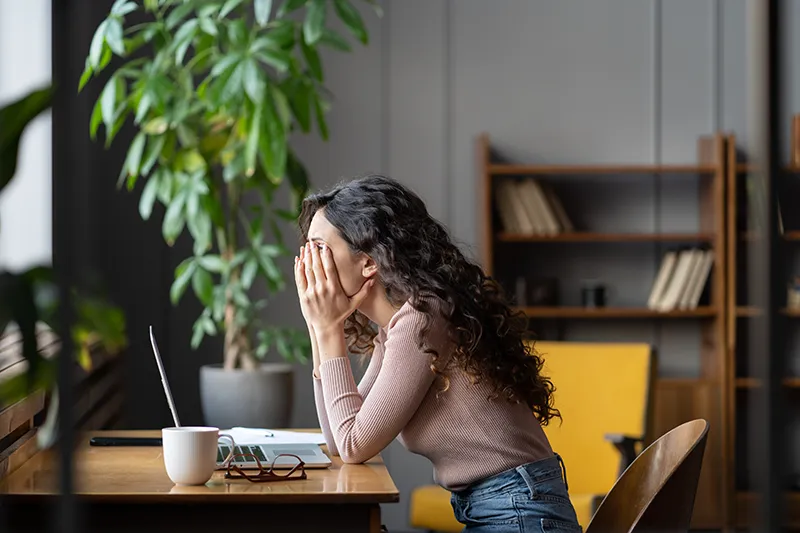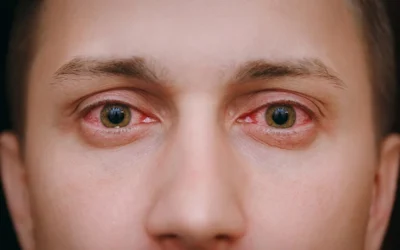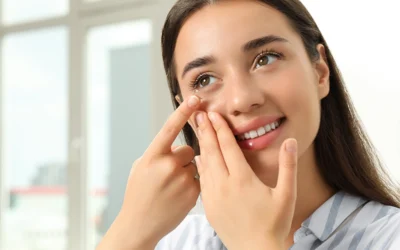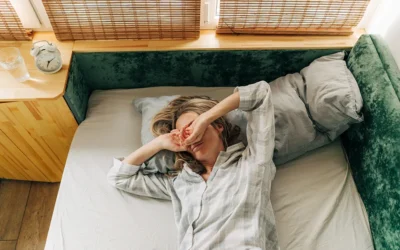We all know how it feels to push through a day after a late night. Your body feels sluggish, your mood might be off, and your eyes just don’t seem right. Fatigue can make them dry, blurry, or even twitchy. If you have vision concerns, Ideal EyeCare offers comprehensive eye exams in Omaha and Council Bluffs to detect changes in your vision and eye health linked to sleep habits.
In this blog, we’ll explore how lack of sleep affects your vision, what signs to watch for, and ways to protect your eyes.
Can lack of sleep cause vision problems?
Your eyes work hard all day, and they rely on rest to recover. Skipping sleep can leave your eyes feeling irritated, dry, and more sensitive to light. Poor rest can also make it harder for your eyes to focus, which can cause blurry vision. Some people even experience involuntary eyelid spasms called myokymia after several nights of inadequate sleep.
Without enough shut-eye, your eyes don’t produce as many tears, which can lead to symptoms that may require dry eye treatment from an eye care professional.
Sleep and long-term eye health
Chronic sleep deprivation doesn’t just make your eyes uncomfortable in the short term. Over time, it may contribute to more serious problems such as glaucoma or worsening vision issues. Your eyes depend on proper blood flow and oxygen while you sleep, and missing out can strain the delicate structures inside them.
Regular visits with our optometrists in Council Bluffs and Omaha can help you stay ahead of these risks and catch any early warning signs before they progress.
Myopia and sleep
Around 34% of people worldwide suffer from nearsightedness (myopia), and that number is expected to increase to 50% by 20501,2. Myopia usually develops during childhood and adolescence, so efforts to slow its progression need to start early.
Sleep deprivation may play a role in myopia risk for young people. One study found that 12- to 19-year-olds who slept fewer than 5 hours per night were 41% more likely to have myopia than those who got more than 9 hours of sleep3. While this doesn’t prove that lack of sleep directly causes myopia, it does suggest a strong link between reduced sleep and nearsightedness.
Mild myopia typically isn’t dangerous, but high myopia can raise the risk of serious eye diseases like retinal detachment and macular degeneration later in life. Healthy sleep habits and starting myopia management early can help protect vision.
Diabetic eye problems and sleep
For people with diabetes, poor sleep habits may be even more damaging. Research suggests a “U-shaped” relationship between sleep and diabetic retinopathy4:
- 6–8 hours is ideal: People who sleep within this range have the lowest risk of moderate diabetic retinopathy, with the ideal range being about 7 to 7.5 hours per night.
- Too much or too little increases risk: Both shorter and longer sleep durations raise the likelihood of developing diabetic retinopathy, and the risk increases the further someone gets from this range.
- Severe cases: For vision-threatening diabetic retinopathy, the optimal sleep range is between 6 and 7 hours.
- Men may be more vulnerable: One study showed that diabetic men who slept outside the ideal range were more likely to develop diabetic retinopathy, while women did not show the same pattern, though more research is needed5.
Maintaining healthy, consistent sleep patterns may help protect against the progression of diabetic eye disease, along with regular eye exams and good blood sugar management.
Tips to protect your vision when you’re not sleeping enough
Life happens, and sometimes you don’t get enough sleep. If you can’t always get the recommended amount of sleep, there are still ways to reduce the strain on your eyes:
- Use artificial tears to keep your eyes hydrated and comfortable.
- Wear blue light glasses when using screens, especially late in the evening, to reduce eye fatigue.
- Take screen breaks using the 20-20-20 rule: every 20 minutes, look at something 20 feet away for at least 20 seconds.
- Stay hydrated to support tear production and eye comfort.
When to schedule an eye exam
If you notice persistent eye discomfort, blurry vision, or increased sensitivity to light, it’s a good idea to book an eye exam. Our experienced eye doctors can determine whether lack of sleep, digital eye strain, or another issue is behind your symptoms. Addressing the cause early can keep your eyes healthier and more comfortable in the long run.
If you think sleep deprivation may be impacting your vision, schedule an appointment with our experts today.
References:
- Holden, B. A., Fricke, T. R., Wilson, D. A., et al. Global prevalence of myopia and high myopia and temporal trends from 2000 through 2050. Ophthalmology. 2016; 123(5): 1036–1042.
- Sankaridurg, P., Tahhan, N., Kandel, H., et al. IMI Impact of Myopia. Invest Ophthalmol Vis Sci. 2021 Apr 28;62(5):2. doi: 10.1167/iovs.62.5.2. PMID: 33909036; PMCID: PMC8083082.
- Jee, D., Morgan, I. G., & Kim, E. C. (2015). Inverse relationship between sleep duration and myopia. Acta Ophthalmologica, 94(3), e204-e210. https://doi.org/10.1111/aos.12776
- Tan, N. Y. Q., Chew, M., Tham, Y.-C., Nguyen, Q. D., Yasuda, M., Cheng, C.-Y., Wong, T. Y., & Sabanayagam, C. (2018). Associations between sleep duration, sleep quality and diabetic retinopathy. PLOS ONE, 13(5), e0196399. https://doi.org/10.1371/journal.pone.0196399
- Jee, D., Keum, N., Kang, S., & Arroyo, J. G. (2017). Sleep and diabetic retinopathy. Acta Ophthalmologica, 95(1), 41–47. https://doi.org/10.1111/aos.13169




